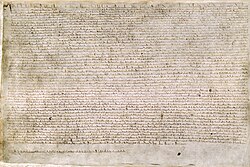ମାନବାଧିକାରସମୂହ
ଦେଖଣା

ମାନବିକ ଅଧିକାରସମୂହ ନୈତିକ ନିୟମାବଳୀ ବା ମାନଦଣ୍ଡ[୧] ମନୁଷ୍ୟର ଆଚରଣର ନିର୍ଦ୍ଦିଷ୍ଟ ମାନକ ବର୍ଣ୍ଣନା କରେ ଏବଂ ନିୟମିତ ଭାବେ ପୌର ଓ ଆନ୍ତର୍ଜାତିକ ଆଇନର ପ୍ରାକୃତିକ ଏବଂ ଆଇନଗତ ଅଧିକାର ଭାବେ ସୁରକ୍ଷିତ ରଖାଯାଏ ।[୨] ସେଗୁଡ଼ିକ ସାଧାରଣତଃ ଅବିଚ୍ଛେଦ୍ୟ,[୩] ମୌଳିକ ଅଧିକାର "ଯାହା ଜଣେ ବ୍ୟକ୍ତି କେବଳ ଜଣେ ମଣିଷ ହୋଇଥିବାରୁ ଆପେଆପେ ପାଇଥାଏ"[୪] ଏବଂ ଯାହା ସେମାନଙ୍କ ବୟସ, ଜନ୍ମଦେଶ, ଅବସ୍ଥିତି, ଭାଷା, ଧର୍ମ, ଜନ୍ମଜାତି ବା ଅନ୍ୟ କୌଣସି ସ୍ଥିତି ନିର୍ବିଶେଷରେ[୩] "ସମସ୍ତ ମଣିଷଙ୍କ ସହଜାତ" ।[୫] ସେସବୁ ସବୁଠି ଓ ସଦା ସାର୍ବଜନୀନତା ଗ୍ରହଣୀୟ[୧] ଓ ସେସବୁ ସମସ୍ତଙ୍କ ପାଇଁ ସମାନ ।[୩]
ଆଧାର
[ସମ୍ପାଦନା]- ↑ ୧.୦ ୧.୧ James Nickel, with assistance from Thomas Pogge, M.B.E. Smith, and Leif Wenar, 13 December 2013, Stanford Encyclopedia of Philosophy, Human Rights, Retrieved 14 August 2014
- ↑ Nickel 2010
- ↑ ୩.୦ ୩.୧ ୩.୨ The United Nations, Office of the High Commissioner of Human Rights, What are human rights?, Retrieved 14 August 2014
- ↑ Sepúlveda et al. 2004, p. 3"Archived copy". Archived from the original on ମାର୍ଚ୍ଚ 28, 2012. Retrieved ନଭେମ୍ବର 8, 2011.
{{cite web}}: CS1 maint: archived copy as title (link) - ↑ Burns H. Weston, 20 March 2014, Encyclopædia Britannica, human rights, Retrieved 14 August 2014
